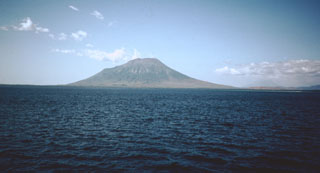Report on Lewotolok (Indonesia) — 12 January-18 January 2022
Smithsonian Institution / US Geological Survey
Weekly Volcanic Activity Report, 12 January-18 January 2022
Managing Editor: Sally Sennert.
Please cite this report as:
Global Volcanism Program, 2022. Report on Lewotolok (Indonesia) (Sennert, S, ed.). Weekly Volcanic Activity Report, 12 January-18 January 2022. Smithsonian Institution and US Geological Survey.
Lewotolok
Indonesia
8.274°S, 123.508°E; summit elev. 1431 m
All times are local (unless otherwise noted)
PVMBG reported that the eruption at Lewotolok continued during 11-16 January. Ash plumes rose as high as 700 m above the summit and drifted E, SE, and W during 11-14 January. Incandescent material ejected up to 300-700 m SE from the vent was accompanied by rumbling and banging noises. Eruption noises persisted through 16 January but weather prevented visual confirmation of activity during 15-16 January. The Alert Level remained at 3 (on a scale of 1-4) and the public was warned to stay 3 km away from the summit crater.
Geological Summary. The Lewotolok (or Lewotolo) stratovolcano occupies the eastern end of an elongated peninsula extending north into the Flores Sea, connected to Lembata (formerly Lomblen) Island by a narrow isthmus. It is symmetrical when viewed from the north and east. A small cone with a 130-m-wide crater constructed at the SE side of a larger crater forms the volcano's high point. Many lava flows have reached the coastline. Eruptions recorded since 1660 have consisted of explosive activity from the summit crater.
Source: Pusat Vulkanologi dan Mitigasi Bencana Geologi (PVMBG, also known as CVGHM)

